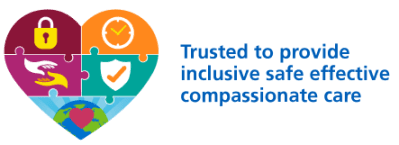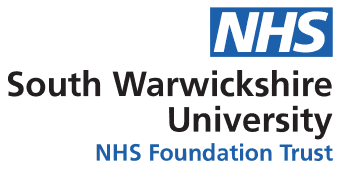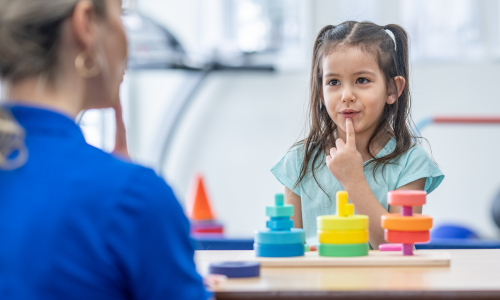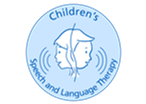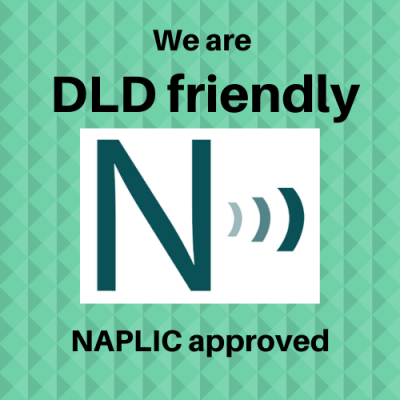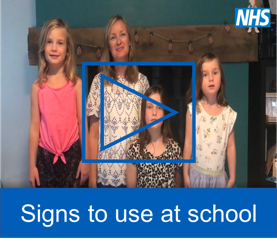The Pre-School team provides support for children ages 0-5 years across a range of settings, including nurseries, children’s centres and community clinics. When you see us for the first time, the therapist will talk to you about your concerns and assess your child’s strengths and needs through play. Following assessment the therapist will give advice including strategies to use at home and in their early years setting. Your child may also be offered clinic based group or individual therapy dependent on their need.
We work closely with Early Years settings, Health Visitors, Specialist Teachers and other professionals to support your child’s development. We also contribute to Education, Health and Care Plans if required.
The pyramid below shows how communication skills develop. The skills at the bottom come first and need to be in place to support the development of the skills higher up the pyramid.
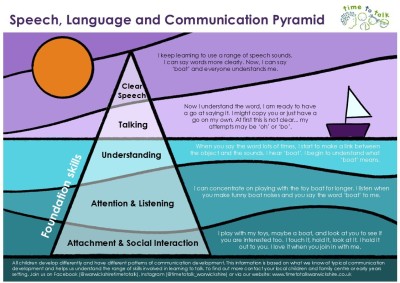
Please click on the links below for further info and advice about how to support your child’s communication development, and find us on Facebook and X (formerly Twitter)!

Take a look at our leaflets for developing your child’s social communication and play skills:
For simple, fun activities that you and your child can do together to develop play and communication, visit Hungry Little Minds.
For advice and support for autism:
Take a look at our leaflets and play ideas for developing your child’s attention and listening skills:
Information about typical language development and ages and stages.
Take a look at our leaflets for developing your child’s early language skills:
Information about typical speech development
Take a look at our advice leaflets for supporting speech sound development:
Using Makaton can help develop children’s language skills. We have created these videos for key signs to use at home and at nursery/school. More information about Makaton.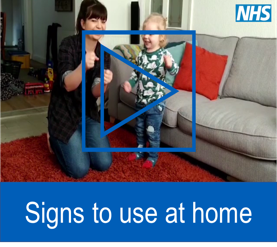
There are some simple strategies we can use to support children’s language development. Watch the videos below from our ‘Time to Talk’ Team to learn about how to use these strategies during play and everyday routines with your child.
- Repetition
- Slowing down
- Keep it simple and use gestures
- Talk to your child
- Join in
- Face to face
The BBC’s Tiny Happy People has some great videos to support communication development. Take a look at these fab videos for supporting early language development:
- Four top tips for talking to your baby
- Early language development - Helpful advice from a Speech and Language Therapist
- Early language development - Five top tips from a Speech and Language Therapist
- Dr Guddi Singh's top tips for 9-12 months: Using actions with your words
- Dr Guddi Singh's top tips for 9-12 months: Taking turns
Here are some great videos about using everyday play and daily routines to support communication development:
- Tips for language development - 12-18 months
- Helpful advice from a speech and language therapist - 12-18 months
- Top tips from a speech and language therapist: 18-24 months
- Language development at 18-24 months - tips from a Speech and Language Therapist
- Tools for Talking 18-24 months: Expanding on toddlers' words
‘Time to Talk’ is a project supporting the development of early language and communication skills in babies and children across Warwickshire. For more information, visit:
Visit the Family Information Service page to find support with finding the right childcare choice for you:
Click on the links below to find your local Children’s Centre who can offer support for families aged 0-19 years:
- Nuneaton Children and Family Centres on Facebook
- North Warwickshire Children and Family Centre on Facebook
- Rugby Children and Family Centres on Facebook
- St Michael's Children and Family Centre - Bedworth on Facebook
- Stratford Children and Family Centres on Facebook
- Warwick Children and Family Centres on Facebook
The School-Age team provides support to children in mainstream schools from Reception to Year 6. We also support children with an Education, Health and Care Plan (previously statements of educational need) with their transition into year 7. Each school has a named therapist who will work with your child.
At your first appointment, our therapists will carry out assessments to establish your child’s strengths and needs. Following assessment the therapist will give recommendations and strategies to use at home and in school. Your child may also be offered a programme of work or group / individual therapy sessions dependent on their need.
We work closely with parents, school staff, Specialist Teachers and other professionals to provide effective care as part of a Warwickshire multi-agency Speech, Language and Communication Needs Pathway – please see link below for more details. We also provide support through Education, Health and Care Plans.
All schools in Warwickshire have access to the Speech and Language Resource File, which provides in depth advice and activity ideas. Training and additional Speech and Language Therapy time is available for schools to buy in, please see the ‘Traded Service’ section for more information.
Please use the links below for further advice about how to support your child’s speech and language development.
- An introduction to speech, language and communication needs in the secondary classroom
- Please click here to watch the video, created by Warwickshire County Council, regarding 'Speech, Language and Communication Needs (SLCN) - Strategies for Secondary Schools'.
The Special School Speech and Language Therapy team can support the communication and / or swallowing needs of children and young people with learning difficulties within Warwickshire’s Generic Special Schools:
We also provide a service to Exhall Grange Specialist School.
Each school has a named link speech and language therapist.
To ‘make a difference’…
We know that children need support from everybody they communicate with for the best progress and outcome. Therefore, we expect teachers and teaching assistants to carry out activities under our guidance. These may be activities that are part of the usual school day and so are disguised!
What we do
Our team of Speech and Language Therapists and Speech and Language Therapy Assistants:
- Work with your child, their teacher, and teaching assistants
- Involve you in setting outcomes for your child
- Deliver bespoke training to the schools
- Collaborate with senior members of the school in delivering the service
- Become part of the school team
- Contribute to EHCPs by submitting reports
We assess your child’s level of need for our support against our criteria. We take into account your child’s strengths and difficulties, the impact of the difficulties, and the readiness for support directly from us.
If your child is receiving a service from us, he/she will have a named Speech and Language Therapist.
We can offer help with
- Interaction skills
- Understanding and use of words (spoken, signed, pictures, symbols, photos)
- Use of alternative methods of communication
- Speech sounds and talking more clearly
- Safe swallowing of food and drink
- Creating a ‘Communication Friendly Environment in school’
To make a referral, please use the form below:
The Dysfluency Team supports children and young people aged 2-18 years who stammer/stutter.
Our aims for children who stammer are:
- For them to say what they want when they want to.
- For the stammer not to affect what they do or don’t do.
- For them to accept the stammer and not let it bother them too much.
- To build confidence.
- To know that it’s OK to stammer!
If your child is in the Early Years Foundation Stage or key stage 1, we work with parents to support your child’s communication skills and confidence. This may be done through parent workshops, specialist therapies and/or reviews with your local therapist. Referral at this stage can be completed using the preschool or school-age (reception onwards) referral form in the above sections.
If your child is in key stage 2, we will continue to work with parents and families to support your child’s communication skills and confidence. We may also begin to work with the child directly, either individually or in a group setting. This may be done through workshops, stammer peer groups, specialist therapies and/or reviews with your local therapist. Referral at this stage can be completed using the school-age referral form in the above sections.
If your child is in key stage 3 or 4, the stammering specialist speech and language therapists will work with young people directly. This can be done individually or in a group setting. Therapy can involve stammer peer groups, specialist therapies and reviews. We also continue to offer stammering workshops for parents and schools.
Referral at this stage can be completed using the school-age referral form in the above sections.
Episodes of care:
We know stammering and its impact can go up and down. There may be a time when your child’s needs are being met with the environmental support in place and the impact of their stammer is reduced, therefore we would discharge from the service. However, we also know this can change and the impact can increase again; if you notice your child:
- finding it hard to get their words out and showing tension and struggle
- using tricks to get their words out, such as tapping their leg, adding extra words or sounds or taking a deep breath
- avoiding certain words or sounds
- avoiding talking or situations because of their stammer
- asking for help with their stammer
You can contact us at any of our main bases and let us know that your child has previously been seen for a stammer and you would like further input. We will then contact you within 8 weeks to discuss the way forward for your child.
Further support:
We recommend the following websites as places to get further information and support:
- Eating and Drinking Referral Form
- Dysphagia Specialist Team Leaflet
- Developmental Language Disorder
- Please click here to watch the video, created by Warwickshire County Council, regarding 'Developmental Language Disorder: How to identify it and what to do next'.
What is Dysphagia ?
Dysphagia describes eating, drinking and swallowing difficulties in infants, children, young people, and adults.
How can it affect children?
Some children with dysphagia may have difficulties co-ordinating their tongue, jaw or lips which affects their ability to control food in their mouth while others may have difficulties co-ordinating their swallow and the muscles of the throat.
A child with Dysphagia may present with the following symptoms when eating/drinking:
- Coughing or choking
- Eye watering or tearing
- A wet or ‘gurgly’ voice
- Changes in breathing rate
- Colour change in their face
- Vomiting or gagging
- Difficulties chewing or moving the food in the mouth
- A sensation that food gets stuck in the throat or chest
A child with Dysphagia may also suffer with:
- Weight loss
- Malnutrition/Dehydration
- Chest infections or respiratory illness
- Poor appetite
We see children:
- from birth to 18 years of age (19 years if they attend a Special School)
- who have complex needs which affect their eating and drinking
- who have structural problems which affect their eating and drinking
- who have developmental difficulties which affect their eating and drinking
- whose medical problems or past medical problems affect their willingness to eat
- who have a GP in Warwickshire
- As Inpatients at Special Care Baby Unit (SCBU) and MacGregor Children’s Ward, Warwick Hospital or SCBU at George Eliot Hospital, who have eating, drinking, or swallowing difficulties
Unfortunately, we don’t see
- We do not currently have a service to support children with purely sensory based feeding difficulties i.e., children who have age-appropriate chewing and swallowing skills but are selective about what they eat and drink particularly sensitivities associated with Autism. However, please see ‘useful websites’ in the section below for information you might find helpful.
- We do not see children about general weaning advice. However, please contact your Health Visitor if you would like support with this.
Our leaflets:
- Dysphagia Service Leaflet
- Supporting Children with Sensory Feeding Difficulties
- Saliva Control for pre-school Children
- Developing Chewing Skills
If you are concerned about your child’s ability to participate in meal-times due to their physical or sensory needs, then these advice leaflets available on the Paediatric Occupational Therapy website may be useful:
- My child is a Fussy Eater
- My child can’t sit upright to eat a meal
- My child can’t use a knife and fork
- Video on posture preparation – this video advises on how to help your child sit stably. The ability to sit stably is a very important stage to reach before being able to chew effectively and self-feed.
Also our Dietitian’s leaflet:
- Helping your child to eat
General weaning advice and early years
- Start for life is a useful website offering trusted NHS help and advice during pregnancy, birth and parenthood. It has some great advice and videos around feeding your child which offer reassurance around what to expect and what to look out for along your baby’s feeding journey.
- Health for under 5’s is a useful website for parents. It has a ‘Feeding and Nutrition’ section which provides tips and advice ranging from starting solids to healthy recipes and guidance on portion sizes. https://healthforunder5s.co.uk/warwickshire
- The infant and Toddler Forum has practical evidence-based resources to support infant and children with feeding such as appropriate portion sizes and common difficulties that can occur, ‘Fussy and Faddy Eating in Toddlers’.
- Some simple and practical tips for a healthy lifestyles, such as: fussy eating, starting solids and creating a happy family meal time.
Babies born premature or sick
- Bliss is a charity for babies born premature or sick. Their website has lots of practical information to support parents from the start of their journey in neonatal care through to later in childhood. It also has some useful information on feeding such as ‘How do I know if my baby is ready to wean'.
Neurodivergent children: Autism, ADHD and extreme food refusal
We don’t provide a specific service for children presenting with purely sensory based feeding difficulties associated with Autism. Coventry and Warwickshire Partnership Trust and Warwickshire County Council, have produced a document to support Neurodivergent people and their families.
The link takes you to their information and advice which includes eating and difficulties associated with Autism including a video workshop presentation.
- Advice for Neurodivergent people and their families document
- Below is a video on managing mealtimes with neurodivergent children.
If you have concerns about your child’s Eating and/or Drinking skills please complete our referral form and return by email to the address on the form.
Before making a referral, please consider:
- If you need advice/support with how to progress with weaning, or how to reduce your baby’s milk intake, or have concerns about general development please contact your Health Visitor in the first instance.
- If you are concerned that your child is unwell or may have an underlying medical condition that you feel is impacting on feeding, such as Reflux or Thrush or problems with breathing, please contact your GP for advice in the first instance.
When we receive a referral, we will aim to see you and your child as soon as we are able, the timing of this is based on how urgent the difficulties are. Referrals are checked when they arrive and you may receive a phone call to discuss the referral further in order to help ensure we see your child in the appropriate time.
We may then offer you a virtual initial conversation and screening assessment and then, if necessary, if we feel a swallowing assessment is appropriate then a face-to-face home visit will be offered at a time agreed together.
We will need to see your child having something to eat and drink and will offer reassurance and/or advice or strategies on how to improve your child’s skills and discharge on first meeting or it may be that your child requires further assessment and on-going support. We may suggest further assessment before giving any further guidance.
Children with more severe and persistent speech and language difficulties often have Special Educational Needs and will require extra support at school. Speech and Language Therapists work with families, teachers and other professionals to identify needs and to provide the support needed for a child to learn and enjoy their time at school. You can read more about the Speech & Language Therapy SEND ‘Local Offer' below.
We are currently offering whole school training for free – please see the flyer for more details.
School Based Traded Service
The NHS is able to provide services for children with the highest level of Speech & Language Therapy need. However there is a significant group of children who have language and communication difficulties that do not meet the criteria for on-going support under the NHS. Schools can purchase additional Speech and Language Therapy time to support these children.
This time can be used for:
- Observation of child in the classroom/playground
- Assessment of a child
- Advising school staff
- Meeting with parent/carers
- Planning and review meetings
- Training school staff (see below)
- Running language / communication groups or individual therapy sessions
Training
Makaton training (beginner & follow up) is available for parents and professionals. For details of the next course in your area please contact your local SLT department.
Schools are able to buy in specific training packages for members of staff including:
- Classroom Communicators (comprehensive TA training)
- Tuned-in (developing attention and listening skills)
- Word Power (vocabulary teaching and learning)
- A Practical Guide to Speech, Phonological Skills and Literacy
- Setting up and running a range of language groups to develop listening, memory, understanding, talking and social skills.
Please see our Training Brochure for more details.
Early years staff can access training through ‘time to talk’™, find out more from their website.
Please contact your nearest base if you require further information.
Nuneaton, Bedworth and Rural North
Speech and Language Therapy Centre
Clinic Drive
Off Coton Road
Nuneaton
CV11 5TT
Tel: 0247 637 8620
Rugby
The Orchard Centre for Community Health
Lower Hillmorton Road
Rugby
CV21 3SR
Tel: 01788 555 107
Warwick, Leamington and Kenilworth
Acorn House
Station Avenue
Warwick
CV34 4RT
Tel: 01926 567139
Stratford
Stratford Healthcare
Building One
Arden Street
Stratford upon Avon
CV37 6NQ
Tel: 01789 405100 Ext 346
